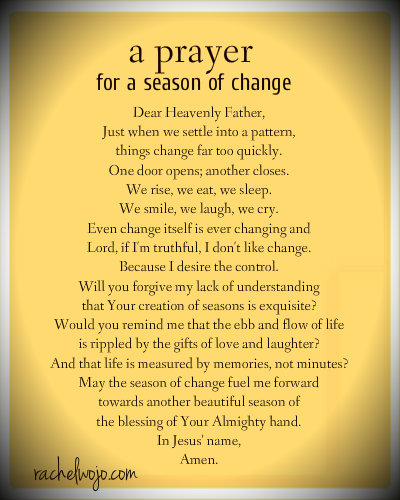A SEASON OF CHANGE
Ecclesiastes 3:1-2
John 12:24
Luke 13:6-9
Once thing we know about life is that change is certain. It's eve3n in the pattern of God's creation: caterpillars become butterflies and pollywogs become frogs. Even the church and its ministries need to change and transform to continue to pass the gospel from one generation to the next. In this time of changing metaphors and models of doing church, what are the metaphors from Scripture that we can use for discernment?
Ecclesiastes 3:1-2
For everything there is a season, and a time for every matter under heaven: a time to be born, and a time to die;
One of the hardest things churches have to do is the respectful burial of the activities and ministries that have become traditions in a local faith community. In a season of change, it is important to ask the hard questions. Does this activity or ministry fulfill a relevant need in the church or in the community? Is it being blessed with resources to continue? Does this tradition serve the mission and ministry of the Kingdom of God and pass on the faith to new generations?The answers to these questions doe not devalue of the ministry or activity and the impact it had during it's season. It should be celebrated for what it was and what it meant to people and then respectfully put to rest as we discern what God has for us now.
John 12:24
Very truly, I tell you, unless a grain of wheat falls into the earth and dies, it remains just a single grain; but if it dies, it bears much fruit.
The last thing that Jesus' disciples wanted to hear was that He had to die was because it did fit with what they wanted to happen. His death was not on their agenda.So too, when we discern the viability of a ministry or tradition, we must consider if we're hanging to on to it because we don't want to let it go, that it has become more about us than about Christ. If that is the case, I believe this parable tells us it is better to lay it down and stand back and let God work as God wills.
Luke 13:6-9
The landowner, after inspecting his fig grove, orders a tree which has never produced fruit be dug up and destroyed. The gardner asks for a second chance for the plant. The gardener will cultivate the soil around the roots of the tree, fertilize it and give it special attention. Then, if it doesn't produce fruit next year, cut it down.
When evaluating the effectiveness of a ministry, we should ask if we have invested our commitment, time and resources that are needed. Have we been willing to bet involved and get our hands dirty, or have we just allowed it to coast along, perhaps pleading that "it's someone else's responsibility?"
I've learned that, when it comes to prairie restoration, the seed of native plants are still in the soil waiting for the soil to be disturbed. Originally, the great herds of buffaloes, pawing up the soil helped. Nowadays, prairie conservationists will plow sections of the prairie for the same results.
Have we been willing to dig up the soil, stir things up, make changes and try new things? In other words, has the ministry been withering away from our neglect?
We are in a season of change as we follow God into the twenty-first century. Our journey may do well to begin in a season of discernment, reading, studying and praying the metaphors from Scripture we have been given.
 |
| by |



Comments
Post a Comment